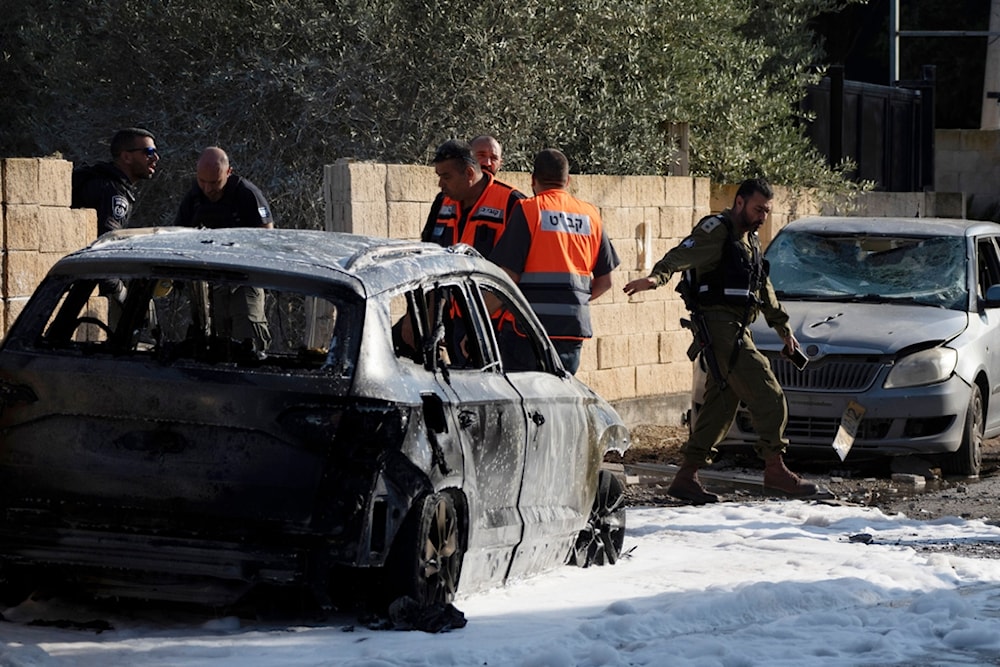Northern Israeli settlements chiefs: Truce gives Hezbollah upper hand
The mayor of Kiryat Shmona expressed concern that such an agreement could lead to a repeat of the October 7 scenario in northern occupied Palestine.
-

Members of the Israeli occupation forces work at the site where a rocket fired from Lebanon hit an area in the town of Nahariya, northern occupied Palestine, Thursday, November 21, 2024 (AP)
As speculation grows about a possible ceasefire agreement in Lebanon, fueled by media reports and cautious remarks from officials in Beirut, voices of dissent are growing within the Israeli occupation, particularly from northern settlement chiefs. Many are labeling the potential deal as an Israeli "surrender agreement" to Hezbollah.
David Azoulay, head of the settlement council in Metula, located in the al-Jalil Panhandle, dismissed claims that the Israeli occupation had achieved its war objectives, calling such statements "lies." He asked, "Why is the most right-wing government in Israeli history heading toward a surrender agreement with Hezbollah?"
Similarly, Avichai Stern, mayor of Kiryat Shmona, expressed concern that such an agreement could lead to a repeat of the October 7 scenario in northern occupied Palestine. He urged Israeli leaders to avoid putting northerners at risk, warning that they could become "the next hostages." Stern added, "I don't understand how we've gone from total victory to total surrender."
Yossi Hadad, head of the regional council of Mateh Asher in the western al-Jalil, cautioned that signing the agreement could result in a stronger Hezbollah in the coming years, saying, "We will pay in blood for this."
Benny Ben Muvhar, leader of the Mevo'ot HaHermon regional council, declared that settlers would not return to the north under such an agreement, which undermines one of the war's stated objectives.
'Settlers cannot return safely'
Moshe Davidovich, chair of the "Frontline Settlements Forum" along the border with Lebanon, criticized the Israeli government for making decisions "over our heads." He argued, "We cannot return to the north safely under such a deal. We want to live in safety, and the government has failed to provide that."
In comments to Israeli Channel 12, Davidovitch described the impact of Hezbollah's operations on northern settlements, saying, "The roads are destroyed, and the war has devastated livelihoods, the economy, tourism, and agriculture."
Eli Dokursky, mayor of Kiryat Bialik near Haifa, echoed this frustration, expressing the settlers' sense of abandonment. He said, "I hope the hardships we endured over the past two months, with Haifa facing heavy fire, weren't for nothing."
Israeli media has also been critical, with Channel 12 referring to the agreement as a "shield for Hezbollah," while Colonel (Res.) Gabi Siboni conceded that Hezbollah's presence and infrastructure, even south of the Litani River, would remain intact and that "no one will dismantle it."
These criticisms reflect widespread dissatisfaction among settlers and military experts who feel betrayed by Prime Minister Benjamin Netanyahu's declarations of "total victory." Many have directly accused him of abandoning northern communities, stating, "You've left us with empty promises. The blood of Israelis in the north will be on your hands."
Ceasefire agreed upon 'in principle'
Israeli Prime Minister Benjamin Netanyahu has reportedly approved a ceasefire with Lebanon "in principle" following security consultations held with Israeli officials late Sunday, an informed source told CNN.
Regardless, the source stated that "Israel" still had its reservations regarding certain details of the ceasefire, which are expected to be relayed to the Lebanese government on Monday. Negotiations to resolve all disputed issues are also expected before moving forward with an agreement.
Moreover, the agreement hinges on the Israeli cabinet's approval, which has not yet materialized.
Sources familiar with the negotiations have expressed optimism regarding the ceasefire, but remained wary as crossfire was still active, which risks ruining the chances for a truce.
On Sunday, Israeli Prime Minister Benjamin Netanyahu held "high-level consultations" on a mediated ceasefire agreement with the Islamic Resistance in Lebanon - Hezbollah, as reports indicate an Israeli inclination to accept a US-brokered agreement.
Reports have conflicted on whether Netanyahu has approved efforts to reach an agreement, with Israeli media outlets offering differing accounts.
The consultation included a few senior Israeli ministers and security officials, focusing on how Netanyahu "should present the agreement to the Israeli public after giving US mediator Amos Hochstein the green light to move ahead with the proposal."
While the government-funded Israeli Broadcasting Corporation (KAN) cited an Israeli official who said that there has been "no green light yet" for an agreement with Lebanon, Yedioth Ahronoth and Axios' Barak Ravid had also reported on a preliminary Israeli green light to a US-backed ceasefire deal.

 4 Min Read
4 Min Read








